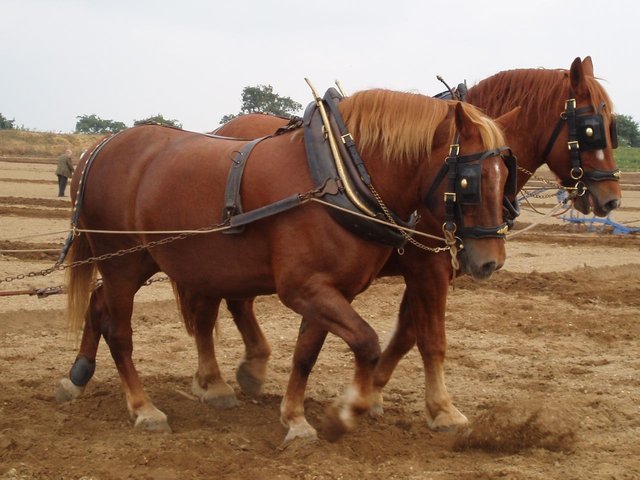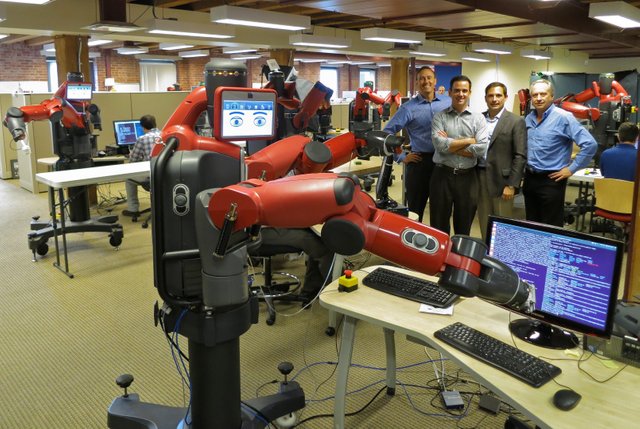Technological Unemployment: The Horse Analogy
TECHNOLOGICAL UNEMPLOYMENT: THE HORSE ANALOGY
Ok, first of all I should admit that this analogy is not an invention of mine. It features in this documentary:
But it is a good one so I thought I would spread the word.
Imagine it is 1915. At this point in time, the horse population of America is at its peak, with some 21 million of these animals put into service of mankind. For tens of thousands of years, people have relied on the superior strength of animals like horses and oxen to help plough soil, pull barges along canals, work down coal mines, provide transportation, even as weapons of war. Imagine that two horses have heard of a new invention, something called the internal combustion engine, and they have different opinions concerning what impact this invention is going to have on horse labour.
One horse believes that the internal combustion engine is going to steal horses' jobs. People will make mechanical horses that cost less money to upkeep, and will be capable of doing more work. It makes references to the The first Benz 954 cc single-cylinder four-stroke engine with trembler coil ignition, capable of producing 2⁄3 horsepower, and points out that the amount of horsepower that can be obtained from internal combustion engines has gone up and up. Horses have long been used to a vast advantage in strength in comparison to people, but now people have invented something which will quickly match the strength of horses and then, not long after, go way beyond them. It imagines a world full of mighty muscular machines, horsepower not counted in single figures but 1000 horsepower and maybe more. As far as employment is concerned, the future looks pretty bleak for horses. Their services are simply not going to be needed to anything like the extent to which mankind has relied on horses in the past.
The other horse has a more optimistic view of the situation. It acknowledges that there is this invention called the internal combustion engine, and that it has been incorporated into machines which have begun competing with horsework in some narrow situations. But it points out how superior horses still are in many cases. Yes, a car put in an environment designed to favour it can outperform a horse. A race between a sportscar on a nice long stretch of smooth tarmac would absolutely trounce a horse in a race. But what if the race were across farmland, with soil churned up by a plough, and obstacles like rivers and fences and hedges to be crossed? Who then would bet on the car taking first place?
This horse also points out that many of the jobs humans have horses do is dirty and dangerous work. Take those poor horses used down coal mines, or the warhorses rode into battle. The jobs horses have been given in cities, it argues, are more pleasant than the grim labour once imposed on the species. For this horse, it is simply infeasible that equine jobs will be consigned to the dustbin of history. Technology will change jobs for sure, always has always will. But technology is a creator of jobs for horses as well as a destroyer. Just as the horse collar, the stirrup, and the carriage opened up new ways for people and horses to cooperate in running the economy, so too will the internal combustion engine provide new forms of employment for horses that nobody can imagine today.

(Image from Wikimedia commons)
Well, we all know which horse was right. It was indeed the case that the internal combustion engine went onto become a massively successful invention, installed in a bewildering variety of machines. Cars, trucks, tractors, diggers, bulldozers...Our reliance on the brute strength of machines has gone up and up, and our reliance on horses has gone down and down. Sure, horse employment has not fallen to zero. But it IS a tiny fraction of what it once was. As far as horses are concerned, I think it's fair to say technological unemployment is pretty much a reality.
I would hazard a guess that this outcome is of no particular surprise to anyone. It is a simple process of extrapolation, right? What kind of progress was horsepower making in horses? Hardly any at all. A horse could produce one, two, three horsepower just as its ancestors stretching back tens of thousands of years could. Machines, on the other hand, were producing more and more in a comparative blink of the eye. It was just inevitable that, sooner or later, machines built to do physical labour would so vastly outperform horses in all but a few very narrow circumstances, economic logic would have to reach the conclusion that employment for horses was a thing of the past.
How does this example of a law of economics strike you: "New technology means new and better jobs for horses". I am guessing you are thinking that sounds pretty daft. There is simply no law of economics or nature or anything at all which says new technology must create new and better jobs for horses. Capitalism does not give a damn about horses. It will of course commodify, and create markets for buying and selling horse labour so long as there is profit to be made from doing so, but there is nothing in capitalism's prime objective of growth and the lowering of costs and raising of productivity that says it must always provide jobs for horses.
This is so obvious that it hardly needs saying. But I am using horses and horse employment as an analogy for human employment. While I suspect it would be very difficult to find anybody who agrees with a statement like 'new technology means new and better jobs for horses', it is quite easy to find people who think there is something like a law of economics which says "new technology means new and better jobs for people". Why? Because this is what past experience has taught us to expect, I guess. We moved from backbreaking subsistence farming, to the arduous toil of factory work to the bullshit jobs of office work, where employees spend five hours of a 40 hour week doing actual work (itself ridiculously easy in comparison to the hard labour of yore) and the other 35 attending 'motivational seminars' or playing around on Facebook. Just as horses had the advantage of millions of years of natural selection fine-tuning them for the job of trotting and galloping around fields, meadows and marshes, humans had the advantage of millions of years of natural selection fine-tuning them for the job of doing tasks which require common sense, language ability, and creative thinking. While it now has to be conceded that machines can indeed totally trounce horses in a contest of brute strength, and that technological unemployment for horses did indeed happen as an inevitable consequence of this disparity, there are still people who believe that there is something special about humans which somehow means technological unemployment is never going to happen; that no matter how many of our current jobs are taken over by robots or rendered obsolete by some other technology (who needs banks and all the middleman services that go with them when you can do banking with blockchain cryptography and Apple Pay using your smartphone?) new work that no machine could possibly do for ages and ages is bound to come along.

(Image from wikimedia commons)
In the case of horses, we have the benefit of 20/20 hindsight when it comes to talking about what the internal combustion engine ultimately meant for their job prospects. When it comes to AI and robotics and what it means for human employment, well, much of that lies in the future and our vision of things to come is nothing like as clear. When will autonomous vehicles mean the end of that line of work for people? When will Dr Watson be attending to your medical needs? When will robocop be protecting the innocent, serving the public trust, and upholding the law? When will you find yourself in a loser's race fighting the impossible fight to retrain for jobs that are disappearing faster than people can adapt to new circumstances, outcompeted by artificial general intelligence or a cambrian explosion of narrow AI applications and innovations in manufacturing techniques producing specialised machines to do any particular task with greater efficiency and less cost than humans can offer? Years, decades? I for one would not presume to know the answer to this question.
But I do know this: Horses were nature's proof of principle that it is possible to make a machine that can do pretty much all the work horses are good for. What possible reason could there be to suppose that humans are not nature's proof of principle that machines can do pretty much any job humans are good for? I do not think there is any practical reason to suppose there is anything humans can do that a machine, in principle, cannot. We need to confront the coming reality of technological unemployment while we still have the luxury of time in which to decide our best course of action, not bury our heads in the sand like my fictional horse.
Oh, wait, that is camels isn't it?
References:
The Singularity Is Near by Ray Kurzweil
The Rational Optimist by Matt Ridley
I have been saying for years, technological unemployment is a certainty. Upvoted!
Agreed. Serious discussions should be made about this. No jobs are safe... Basic income and the arts maybe our future. Thanks for sharing.
This is so true robots have already begun the take over. Soon people will need different kinds of work since several jobs are being done or soon will be done by robots.
A new way of living is required at such a point. Yes, thinking about the eventualities that come is required. Many people seem to imagine everything will be fine, but there will be turmoil as bots replace manual human labor. Then those people need to get a new job, in a new sector, such as cognitive sectors. Mental jobs will be almost the only thing once robots take over physical jobs.